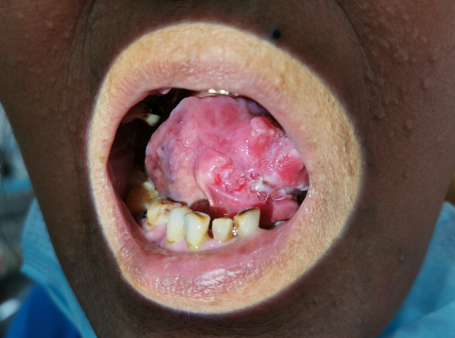i have a lump in my tongue, could it be cancer?

These are pictures of 2 patients I saw within a span of 2 hours. The first patient presented with a hard, firm mass located on the underside of his tongue. The second patient presented with a firm mass on his hard palate. Tests were done on both patients and the results showed that both patients had oral cavity cancer: one had squamous cell carcinoma of the tongue, the other patient had squamous cell carcinoma of the hard palate.
Oral cavity cancer happens when the cells lining the mucosa of the oral cavity mutate and grow rapidly. The most common locations for oral cavity cancer are the tongue, tonsils and the oropharynx or the back of your throat.
Statistics show that over 550 new cases of oral, head and neck cancer are diagnosed each year. In the United States, approximately 110,000 people are diagnosed with oral, head and neck cancer every year, with 66 percent of these cases found as late stage 3 or 4 disease.
In the Philippines, oral cancer is the 8th leading type of cancer. World Health Organization (WHO) data published in 2018 showed that oral cancer deaths make up 0.51% of the total deaths in the country
Oral cancers initially present as rough patches of red or white tissue anywhere in the oral cavity. It may also present as a hard lump in the cheek or pain and difficulty of swallowing. It may sometimes present as loosening of teeth without reason.

What are the risk factors for having oral cavity cancer?
Smoking and alcohol intake are the most common risk factors for having cancer in the oral cavity, with around 66 percent of mouth cancers linked to smoking, and drinking beyond more than 10 units of alcohol a week increasing the risk of mouth cancer by 81 percent.. Sun exposure as well as betel nut chewing may also be associated with it. Poor over health of the mouth, teeth and gums,poor oral hygiene, as well as chronic trauma may also lead to oral cavity and oropharyngeal cancer well. Other risk factors include sexually transmitted diseases such as the human papilloma virus (HPV type 16 and 18 are linked to around 73 percent of oropharyngeal cancers), as well as poor nutrition may be linked to oral cancer.
What should you do to avoid having cancer of the oral cavity?
Oral cavity cancer is highly preventable. Avoiding smoking and alcohol, or at least early cessation if one has already started, is advised to avoid having oral cancers. Good oral hygiene and dental heatlh is also encouraged.
In addition to avoidance, it is highly recommended that if any signs of oral cavity cancer is noted, it is important to seek medical consult with your ENT doctor. Any non-healing oral ulcers or red or white patches may warrant further workup if it occurs lasts more than 2 weeks.
Oral and oropharyngeal cancers are among the most common head and neck cancers, yet it is highly preventable. Avoidance or cessation of risk factors, and early consult if with oral symptoms are crucial for early diagnosis and management of these types of cancers.
Experience expert ENT surgical care tailored to your needs.
Book now to schedule your appointment with our skilled ENT surgeon now and take the first step towards a healthier you.
Your well-being is our top priority.

